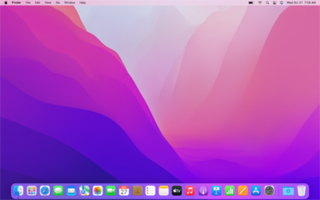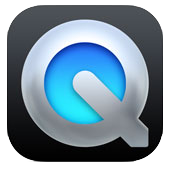Related Research Articles

macOS is a proprietary graphical operating system developed and marketed by Apple Inc. since 2001. It is the primary operating system for Apple's Mac computers. Within the market of desktop and laptop computers it is the second most widely used desktop OS, after Windows NT and ahead of Chrome OS.

QuickTime is an extensible multimedia framework developed by Apple Inc., capable of handling various formats of digital video, picture, sound, panoramic images, and interactivity. First made in 1991, the latest Mac version, QuickTime X, is available for Mac OS X Snow Leopard up to macOS Mojave. Apple ceased support for the Windows version of QuickTime in 2016, and ceased support for QuickTime 7 on macOS in 2018.
New Technology File System (NTFS) is a proprietary journaling file system developed by Microsoft. Starting with Windows NT 3.1, it is the default file system of the Windows NT family. It superseded File Allocation Table (FAT) as the preferred filesystem on Windows but is supported in Linux and BSD as well. NTFS reading and writing support is provided using a free and open-source kernel implementation known as NTFS3 in Linux and the NTFS-3G driver in BSD. Windows can convert FAT32/16/12 into NTFS without the need to rewrite all files. NTFS uses several files typically hidden from the user to store metadata about other files stored on the drive which can help improve speed and performance when reading data. Unlike FAT and High Performance File System (HPFS), NTFS supports access control lists (ACLs), filesystem encryption, transparent compression, sparse files and file system journaling. NTFS also supports shadow copy to allow backups of a system while it is running, but the functionality of the shadow copies varies between different versions of Windows.

macOS Server, formerly Mac OS X Server and OS X Server, is a series of Unix-like server operating systems developed by Apple Inc., based on macOS and later add-on software packages for the latter. macOS Server adds server functionality and system administration tools to macOS and provides tools to manage both macOS-based computers and iOS-based devices.
Darwin is an open-source Unix-like operating system first released by Apple Inc. in 2000. It is composed of code derived from NeXTSTEP, BSD, Mach, and other free software projects' code, as well as code developed by Apple.
The history of macOS, Apple's current Mac operating system formerly named Mac OS X until 2012 and then OS X until 2016, began with the company's project to replace its "classic" Mac OS. That system, up to and including its final release Mac OS 9, was a direct descendant of the operating system Apple had used in its Macintosh computers since their introduction in 1984. However, the current macOS is a Unix operating system built on technology that had been developed at NeXT from the 1980s until Apple purchased the company in early 1997.
The Unix file system (UFS) is a file system supported by many Unix and Unix-like operating systems. It is a distant descendant of the original filesystem used by Version 7 Unix.
In classic Mac OS System 7 and later, and in macOS, an alias is a small file that represents another object in a local, remote, or removable file system and provides a dynamic link to it; the target object may be moved or renamed, and the alias will still link to it. In Windows, a "shortcut", a file with a .lnk extension, performs a similar function.
HFS Plus or HFS+ is a journaling file system developed by Apple Inc. It replaced the Hierarchical File System (HFS) as the primary file system of Apple computers with the 1998 release of Mac OS 8.1. HFS+ continued as the primary Mac OS X file system until it was itself replaced with the Apple File System (APFS), released with macOS High Sierra in 2017. HFS+ is also one of the formats used by the iPod digital music player.

In computing, file system or filesystem is a method and data structure that the operating system uses to control how data is stored and retrieved. Without a file system, data placed in a storage medium would be one large body of data with no way to tell where one piece of data stopped and the next began, or where any piece of data was located when it was time to retrieve it. By separating the data into pieces and giving each piece a name, the data is easily isolated and identified. Taking its name from the way paper-based data management system is named, each group of data is called a "file." The structure and logic rules used to manage the groups of data and their names is called a "file system."
In computing, the File Alteration Monitor, also known as FAM and sgi_fam, provides a subsystem developed by Silicon Graphics for Unix-like operating systems. The FAM subsystem allows applications to watch certain files and be notified when they are modified. This greatly aids the applications, because before FAM existed, such applications would have to read the disk repeatedly to detect any changes, which resulted in high disk and CPU usage.

Mac OS X Leopard is the sixth major release of macOS, Apple's desktop and server operating system for Macintosh computers. Leopard was released on October 26, 2007 as the successor of Mac OS X 10.4 Tiger, and is available in two editions: a desktop version suitable for personal computers, and a server version, Mac OS X Server. It retailed for $129 for the desktop version and $499 for Server. Leopard was superseded by Snow Leopard in 2009. Leopard is the final version of macOS to support the PowerPC architecture as Snow Leopard functions solely on Intel based Macs.
inotify is a Linux kernel subsystem created by John McCutchan, which monitors changes to the filesystem, and reports those changes to applications. It can be used to automatically update directory views, reload configuration files, log changes, backup, synchronize, and upload. The inotifywait and inotifywatch commands allow using the inotify subsystem from the command line. One major use is in desktop search utilities like Beagle, where its functionality permits reindexing of changed files without scanning the filesystem for changes every few minutes, which would be very inefficient.
dnotify is a file system event monitor for the Linux kernel, one of the subfeatures of the fcntl call. It was introduced in the 2.4 kernel series. It has been obsoleted by inotify, but will be retained for compatibility reasons.
Extended file attributes are file system features that enable users to associate computer files with metadata not interpreted by the filesystem, whereas regular attributes have a purpose strictly defined by the filesystem. Unlike forks, which can usually be as large as the maximum file size, extended attributes are usually limited in size to a value significantly smaller than the maximum file size. Typical uses include storing the author of a document, the character encoding of a plain-text document, or a checksum, cryptographic hash or digital certificate, and discretionary access control information.
The following tables compare general and technical information for a number of file systems.

Time Machine is the backup mechanism of macOS, the desktop operating system developed by Apple. The software is designed to work with both local storage devices and network-attached disks, and is most commonly used with external disk drives connected using either USB or Thunderbolt. It was first introduced in Mac OS X 10.5 Leopard and incrementally refined in subsequent releases of macOS. Time Machine was revamped in macOS 11 Big Sur to support APFS, thereby enabling "faster, more compact, and more reliable backups" than were possible previously.

Mac OS X Snow Leopard is the seventh major release of macOS, Apple's desktop and server operating system for Macintosh computers.
Kqueue is a scalable event notification interface introduced in FreeBSD 4.1 on July 2000, also supported in NetBSD, OpenBSD, DragonFly BSD, and macOS. Kqueue was originally authored in 2000 by Jonathan Lemon, then involved with the FreeBSD Core Team. Kqueue makes it possible for software like nginx to solve the c10k problem.
References
- ↑ "Leopard Technology Series for Developers: OS Foundations". 2007-10-26. Retrieved 2008-08-21.
- ↑ "File System Events Programming Guide: Using the File System Events API". 2012-12-13. Retrieved 2017-10-13.
- ↑ "FSEvents.h -- FSEventStreamCallback". 2011-05-05. Archived from the original on 2011-05-04. Retrieved 2011-08-16.
- ↑ "FSEvents reference -- kFSEventStreamCreateFlagFileEvents" . Retrieved 2017-10-13.